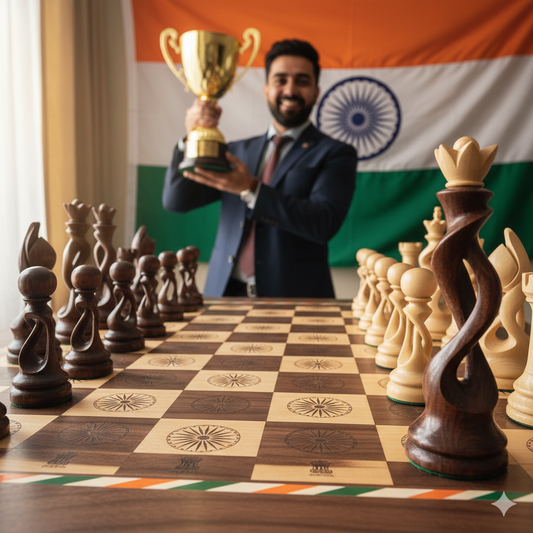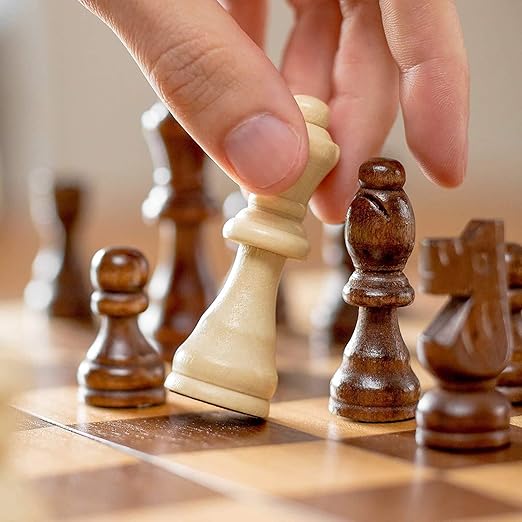
Mastering the Game: Essential Chess Strategies Every Player Should Know
Share
Learn key chess strategies to improve your game, sharpen your focus, and develop strategic thinking, whether for play, study, or lifestyle in the UAE.
Introduction

Chess has often been called the "game of kings"—a timeless battle of intellect where success relies on strategy rather than chance. From the very first move, each decision shapes the game’s outcome. Whether you’re a beginner in the UAE just learning the pieces or an experienced player refining your skills, understanding core chess strategies can elevate your performance and enjoyment.
1. Control the Center
One of the most fundamental principles in chess is controlling the central squares (e4, e5, d4, and d5). Placing your pawns and pieces in the center gives them greater mobility and influence across the board.
- Tip: Moves like 1.e4 or 1.d4 stake an early claim to the center.
- Why it matters: The player who controls the center often dictates the pace of the game.
2. Develop Your Pieces Efficiently
Don’t let your knights and bishops stay idle while pawns move aimlessly. Development means getting your pieces active quickly and harmoniously.
- Bring knights out before bishops.
- Avoid moving the same piece multiple times in the opening unless necessary.
- Don’t waste time chasing pawns when you could develop your army.
Think of your pieces as a team—the faster they join the game, the stronger your position.
3. Protect Your King Early
Castling is a vital defensive and offensive move. It secures your king behind pawns while connecting your rooks for later coordination.
- Castle early (usually kingside) to avoid leaving your king vulnerable.
- If your opponent delays castling, consider applying pressure before they can safeguard their king.
4. Think Ahead: The Power of Planning
Great players anticipate their opponent’s responses. Every move should serve a purpose.
- Short-term plans: Control a file, improve piece position, or attack weak pawns.
- Long-term plans: Coordinate multiple pieces for an attack or dominate key squares.
Example: If your opponent weakens their pawn structure around the king, start planning an attack that uses your queen and bishops to exploit the weakness.
5. Pawn Structure Is the Skeleton of the Game
Pawns determine the shape of the battle. Understanding pawn structure is key to strong chess strategies.
- Doubled, isolated, or backward pawns are usually weaknesses to target.
- A strong pawn chain (e.g., c4-d5-e6) can control key squares and limit enemy pieces.
- Avoid unnecessary pawn moves that create holes in your defense.
6. Use Tactical Motifs
Strategy sets the direction, but tactics decide battles. Learn common tactical patterns:
- Forks: Attacking two pieces at once.
- Pins: Trapping a piece so it can’t move without exposing another.
- Skewers: Forcing a valuable piece to move and capturing what’s behind it.
- Discovered attacks: Moving one piece to unleash another.
7. Transitioning to the Endgame
Even if you dominate the opening and middlegame, a poor endgame can cost you the win.
- Centralize your king—it becomes a powerful piece in the endgame.
- Push passed pawns—they are potential queens.
- Learn basic checkmating patterns (king and queen vs. king, king and rook vs. king).
8. Learn from the Masters
Studying famous games provides insight into timeless chess strategies. Players like Garry Kasparov, Magnus Carlsen, and Viswanathan Anand masterfully combine tactical brilliance with long-term planning.

For inspiration and annotated games, visit ChessBase.
9. Practice and Patience
No strategy is complete without practice. The more you play, the more natural these principles become. Analyze your games, note mistakes, and improve step by step. In the UAE, chess clubs and online platforms offer ample opportunities to test your skills.
Read our related guide on choosing the perfect handcrafted chess set to enhance your playing experience.
Conclusion: Strategy Meets Lifestyle

Chess is more than a game—it’s a reflection of patience, foresight, and creativity. By mastering key chess strategies like controlling the center, developing efficiently, safeguarding your king, and studying endgames, you not only improve your performance but also sharpen skills that apply to real life.
If you’re ready to elevate your game, consider playing on a premium handcrafted chess board. Visit our shop and explore Taj Chess—where tradition, craftsmanship, and strategy meet.
Your next great move begins today.



